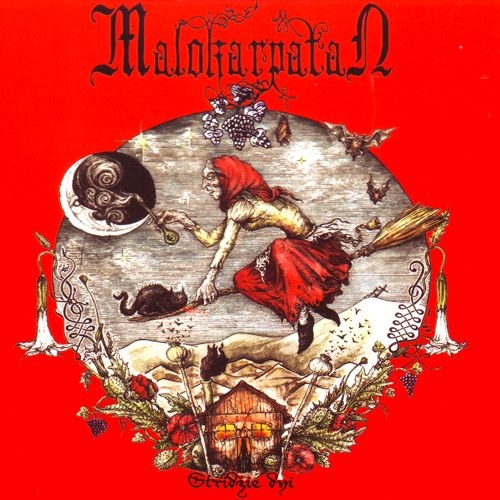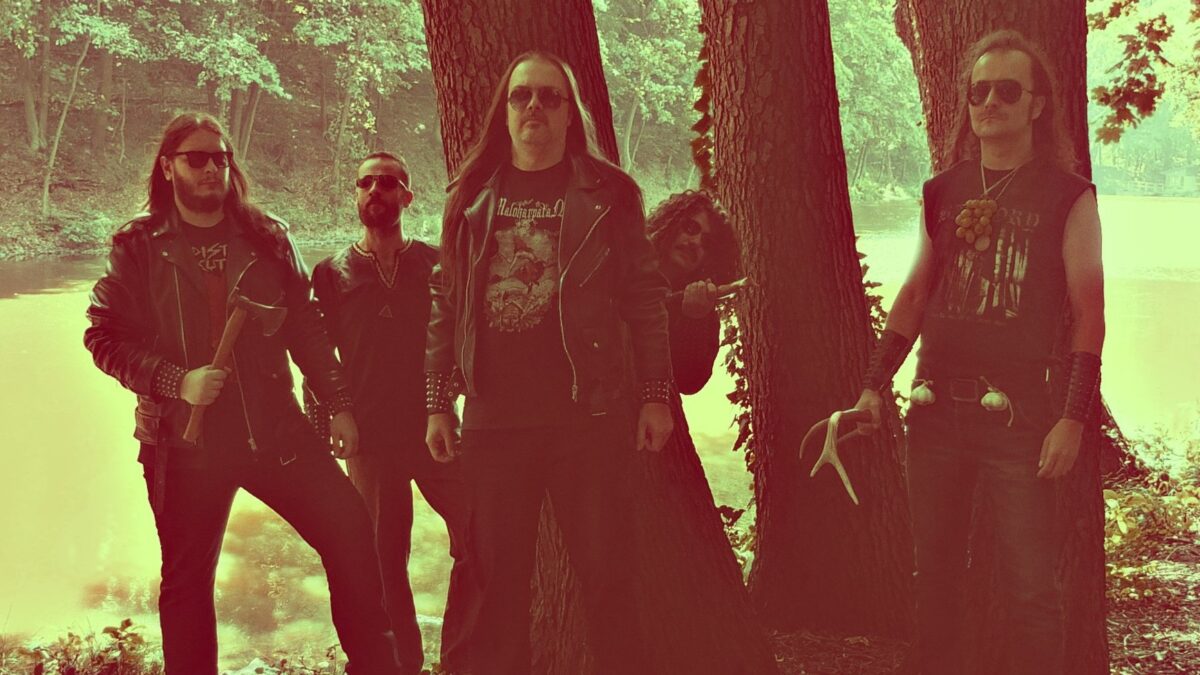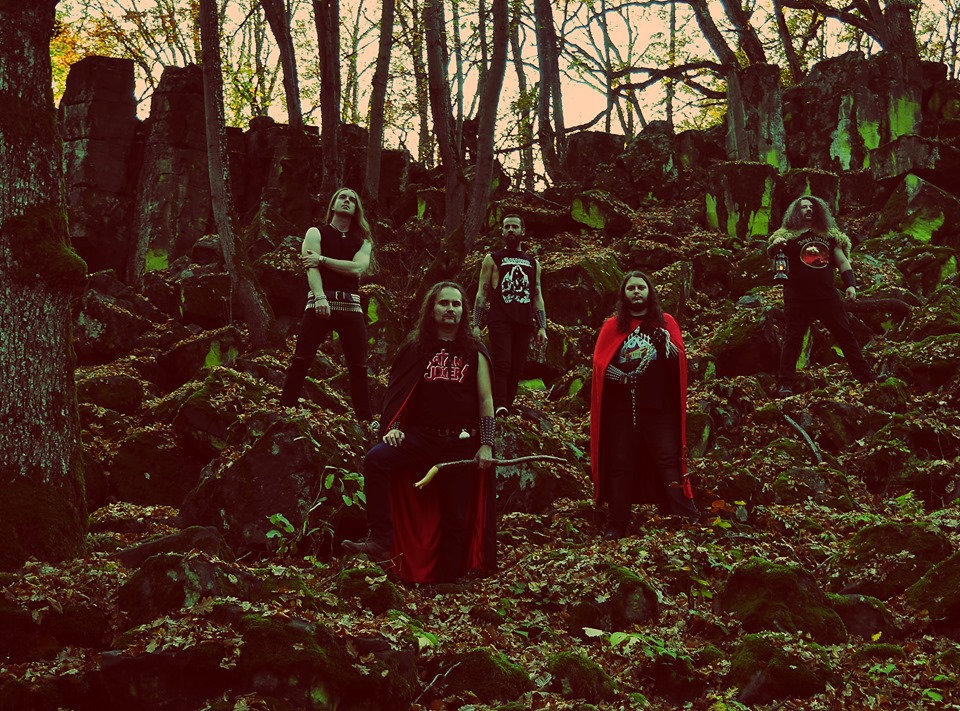Music passionally dedicated to the golden era of black metal and rustic darkness, Malokarpatan have generated quite some fuzz among the underground community ever since their debut. In early 2018 we had the honor to speak with the front man AS and had a rather joyful conversation about his sources of influences, classic black metal/progressive rock, supersitions and folklores in rural Slovak, as well as old Czechoslovakian cinemas.

Interviewed by Blindevourer
Blindevourer: Greetings Adam, we’re so glad to have this interview, a pure underground conversation between you and the Chinese listeners. Say something to the audience!
AS: Greetings Liu, thank you very much for your interest as well! It’s the first time I’m doing an interview for China and probably also the first time for Asia generally. So naturally I am really glad that our music has reached out so far, geographically and culturally. We don’t get in touch with Chinese culture here too often, except for Chinese cuisine which is very popular, but we learn about ancient Chinese civilisation in schools and I always had a huge respect for it – some of the greatest empires in history were located in your lands, with highly developed culture and philosophy. I also like traditional Chinese music and one of my favourite movies is The Horse Thief by Tian Zhuangzhuang.
BD: For most of your listeners, all we know about your band is the music only and we’re curious about something behind, like how the name “Malokarpatan”came along?
AS: It’s a simple name paying honour to our local region where we come from – the mountains here are called Little Carpathians, which is Malé Karpaty in our language. Therefore Malokarpatan means an inhabitant of this region. There is an old tradition of viticulture in here, which is why you can see the grape symbol in our logo. Other than that, the mountains are known for several caves in them and also a lot of castle ruins – the most infamous one being the castle of countess Elizabeth Bathory in Čachtice – our drummer lives just a few miles out of there. Many places here breathe with ancient history, so we take a lot of inspiration from our surroundings.

BD: We noticed that most of you are members of Remmirath. And your 2015 release Shambhala Vril Saucers and Stridžie dni are both interspersed with folk elements. We find it is very hard, producing two albums in the same year. So how you guys manage to allocate the time and creativity so well?
AS: It wasn’t that difficult, because the Remmirath album was recorded during 2013 and early 2014 and then after several months Malokarpatan recordings started in late autumn 2014. In Remmirath we were focused on a lot more experimental type of music – the basic roots were in 90s black metal, but on this second album it evolved into something outside of standard genre classifications. We were influenced by a lot of different things – progressive and psychedelic 70s bands like Gentle Giant, King Crimson, Faust, early electronic music like Kraftwerk or Yellow Magic Orchestra, composers like Stockhausen, Xenakis, Partch, traditional music from different parts of Asia, etc etc. Shambhala Vril Saucers was a difficult and challenging album to make, so returning to my old school metal roots in Malokarpatan was a great form of active relaxation. Playing more simple and primal music again felt refreshing and now it comes full circle when I again started adding more complex and experimental arrangements to the newer Malokarpatan material, while still keeping the primitive old school roots.
BD: China is a country with extensive and profound culture, and so as Slovakia I assume. A good many folk sounds were added through samples and synthesizers in all sensational tracks. Could you give a brief introduction to how your work got inspired by your culture?
AS: like I said Chinese culture is something I have a big respect for! Of course our country is extremely small compared to the vast spaces of yours, so the variety isn’t as big. Despite of that, we have very rich folklore traditions which are easily adapted into black metal music in my opinion. Like in all cultures, there is the light side and the dark side. As a black metal band, we of course focus on the more sinister elements. These themes are often part of our national folktales, so I got into contact with them already as a small child and therefore it is very natural for me to write songs about them. For more details, you can just check the English translations of our lyrics on the internet. I think it brings a bit of own identity and originality to bands, when their concept deals with their home culture. I’m not too good at discovering newer bands, but I remember hearing some Chinese black metal which incorporated your traditional music, I think that is a great idea and for us western people it is also very interesting and refreshing to explore foreign cultures this way. I wish more bands would get inspired directly by their culture, so black metal would get more varied again like it used to be in the 80s and early 90s.

BD: I also set foot in french, I can tell the vocals in the intro Nordkarpatenland used french. Why you chose a foreign language as lyrics?
AS: You can view it as just a small experiment. It came out naturally, not as a plan of ours. One of the special guests on the album was my good friend Annick Giroux from the Franco-Canadian band Cauchemar. I just sent her the demo version of the album and asked if she could record a few atmospheric parts using her vocals and synthesizer. The rest was just free work of her imagination and for the intro part, she recorded this piece of French recitation as a representation of her own culture. So that is the simple philosophy behind it for me – just as we represent our own culture in Malokarpatan, if we have a guest from abroad, he/she is encouraged to present his/her own culture. Another thing that enthralled me about it was that it reminded me of Tristesses de la lune by Celtic Frost.
BD: Compared with the Stridžie dni, the recent recording quality has been upgraded significantly, will you continue to adopt this mixing style in the next album?
AS: Stridžie dni was a completely self-produced recording without any studio budget. I am very satisfied with the result, as it was meant to be an underground sounding album, paying tribute to the old underground black metal spirit. But meanwhile we have evolved from a project into a regular band with full line-up and this has reflected in the song arrangements too, so I decided that Nordkarpatenland should be recorded in a professional studio. It was also a way how to avoid endless delays which always happen when you have unlimited time for the recording. This way, everybody was forced to be in the studio at the same time and focus on work only. I am definitely not a fan of modern, sterile and overly polished productions though and will always try to not have that kind of sound on our albums. I would already make Nordkarpatenland sound a bit filthier if I had the technical knowledge how to do so, but nowadays recording in a studio already means a certain level of polished sound which is something you can’t do much about. As for the future – yes, we will record in a studio again. But we will also keep an organic and atmospheric touch in the sound, because sterile modern production kills the soul of the music.
BD: Ked gazdovi upeleší sa v chyži nezdoba zmo and V rujnovej samote pocichu dumá lovecký zámek zvlčilého grófa, along withthe other tracks are blended with catchy classical music. Are these of your own creation or samples? And odd stuffs like cow bell also appear. What do you think about that?
AS: Mostly they are samples from various sources – from old Czechoslovakian movies with folkloral/fantasy themes, folk recordings, field recordings and also some classical music with hunting themes. Some small parts were also recorded by ourselves using various percussion instruments like chimes, jaw harp, frogbuzzer, etc. I like our albums to have a cinematic aspect to them – where you can just close your eyes and imagine the stories and places from our lyrics while listening. So we add all these parts just to make the overall atmosphere stronger and more intense. I am a big movie fan and I want our music to have atmosphere that reminds of films. Most likely, we will incorporate even more of additional instruments for the next album, while of course still keeping it as metal as possible.

BD: Mixing with Black Metal and Heavy Metal is a highlight of your creation, the band do not seem to be constrained by the style. We’re wondering if your previous albums are more of your own musical taste or a product of teamwork?
AS: I write all the music and lyrics myself, but I always give freedom to other members to come up with their own arrangements to the basic song structures which I present to them. So the main composition is strictly my job, but the final album result is always a team work. I think for a very long time now, people have a vast misunderstanding of what black metal really is. It was never meant to be a specific way of playing – like the fast blastbeats, tremolo riffs and high pitched shrieked vocals that are so typical nowadays because most bands take the Norwegian second wave of black metal as the basic inspiration. But Norwegian black metal was just one way of interpreting the genre, not a manual how to do it for all of the world. Before that, black metal was more of a philosophy and atmosphere – or a feeling as Fenriz once put it, than a specific music technique. With this in mind, it is completely natural for me to blend traditional heavy metal with darker elements, as that was how black metal once came to be in the first place.
BD: Historically Eastern Europe has always been an area of continuous political change, such as Czechoslovakia, how its disintegration impacted your creative background?
AS: Life was never simple here and still isn’t today. Our ages in the group vary, most of the other guys remember the communist days from childhood/youth, personally I was born during its last years, so I grew up in the post-communist era. But back then – during the 90s, you could still feel the influence of the previous four decades at least culturally. So ironically, even if we are a band formed many years after these sociopolitical changes, we draw inspiration from the old Czechoslovakian era a lot. The old movie samples, influence from classic 80s Iron Curtain metal, etc. But there are other influences as well – I take inspiration from the Slovak identity in general – local 19th century Romanticist poetry also means a lot to me, especially for lyrics.
BD: In the early days Malokarpatan is your personal plan, do you plan to use it as your main creative direction? And for the origin musicians of Algor and Krolok. They must be hard to find and combine to work for Malokarpatan.
AS; It is my child mostly, yes. For live concerts, studio and also some arrangements composition, we are a team, but I still write all the music and lyrics by myself. In case someone would bring up a song that would fit in the Malokarpatan universe, I would use it, but to be honest I prefer having creative control. For our drummer who plays in Algor it can be sometimes difficult and challenging, because Algor is a band that is often active live. Krolok works at a slower pace, so it’s a lot less problematic. There are very few people in our country with whom I could work on music as specific as this, so it’s quite natural that I play with musicians that were already busy with other bands and projects before.

BD: Another thing I found interesting is that the vocals Temnohor is older than everyone else in the band, he started career as a musician at 1998, how he joined the band?
AS: He is the oldest one among us, entering his mid-40s this year. His musical efforts started even earlier during the 90s, he was among the first people playing crust punk in our country, but he left that scene after a couple of years because he was not interested in its political elements and his music taste shifted more and more towards black metal and generally old school metal. I’ve known him since the late 90s because he was a friend of my older brother and we would often meet up at our place, have some drinks and listen to records. He is one of my few close friends, so inviting him into the band was a natural choice because of our similar views on many things.
BD: The album has been released for six months, Is there any plan to start preparing the next album?
AS: Definitely, I have many parts of the next album already composed, both musically and lyrically. It is still a bit difficult to predict how will the album end up sounding, but so far I think it will be darker than Nordkarpatenland, while still keeping a strong influence of classic 80s heavy metal and also adding some more atmospheric and experimental elements. Lyrically it will be a concept album this time, dealing with witchcraft trials that happened in 17th century on the territory of current Slovakia. This theme has already been used several times in the genre, but our version will still be unique I think. It will also have a more prominent influence of classic Czechoslovakian metal from the 80s and early 90s golden era, but it will be no boring retro without invention.
BD: In your local metal scene, for bands like Tormentor and Master’s hammer do not focus on the limit of a exact metal music style, to an extent you’re very similar to each other. Do you have any collaboration? Can you introduce some bands like these to us and which band resemble your style?
AS: Good observation, I absolutely agree! Black metal from behind the Iron Curtain was always typical for not respecting any restrictions and letting creativity flow freely. Only this way you can achieve originality – to follow the way you feel and ignore any rules. The only rule for us is for the lyrical concept to have a dark, sinister element and for the music to be real metal. Otherwise, we use a lot of different influences and have no interest in belonging to any current trend or scene. Collaborating with Tormentor would be extremely exciting for me, we are not in contact though. From Master’s Hammer, we have collaborated with their guitarist Necrocock who recorded guest vocals and choirs into one of the Nordkarpatenland songs. The album was also recorded in the same studio in Prague where they gave life to the cult demo The Mass back in 1989. For other old Eastern European bands in this style I can recommend for example: Root, Torr, Kat, Exorcist (Poland), Toxic Trash, Cerberus (Slovakia), Moriorr, Dai, Amon Goeth, Tudor, Fata Morgana, Bombarder, Epizod, Evil Blood, Cerber (Russia), Diktátor, Angel Reaper, Fantom, etc.
BD: Reappear all the elements and atmosphere in an album like Nordkarpatenland to a live show is something almost impossible. How do you choose the elements of the work? You have a lots of touring plans this year, will you visit china? Or any other city in Asia?
AS: For me the album versions are always superior and most important and I prefer to sacrifice the live versions to that. So of course there is no way we could fully recreate everything, but at least we add the atmospheric and keyboard parts through samples now. For this year, we will visit several European countries and also USA and Canada. We haven’t received any offer for Asia so far, but of course we would love to come. So if anyone has serious offers, we would absolutely go to China or elsewhere. For this year we have our plans pretty much full, but I hope we can reach Asia in the future and meet the local metal maniacs there!

BD: Thank you very much for your time and I hope the questions are to your liking. At last follow our tradition, tell us your favorite alcohol. Share and drink!
AS: Thank you as well, it was great to do a first time interview for China! Greetings to anyone who listens to our music there! Maybe we can see you live one day in the future. My favourite alcohol is definitely beer, although many of the other members prefer wine (we even have one song dedicated to wine drinking traditions). I like the standard Pilsner type which is the most common in here, but my personal favourite are Belgian beers with their unique taste – Orval, Duvel, Chimay, etc. From Chinese beer I only had Tsintao, but I hope I can try more sometime!

